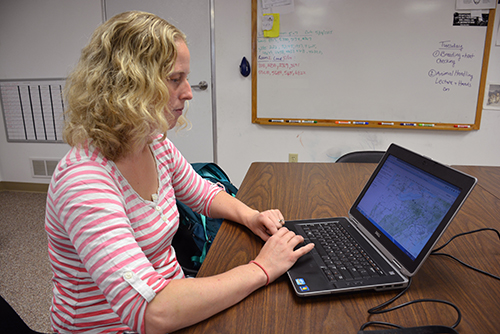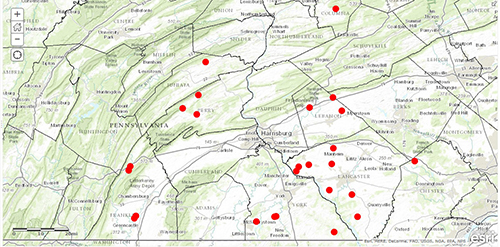Infectious disease can take a major toll on swine farms. Two diseases in particular have hit Pennsylvania hard over the last decade: porcine respiratory and reproductive syndrome (PRRS) and porcine epidemic diarrhea virus (PED). But thanks to a monitoring effort headquartered at Penn’s School of Veterinary Medicine, the impact of these illnesses has been significantly reduced.
With funding from the U.S. Department of Agriculture, Penn Vet’s New Bolton Center created a regional control program for swine disease in 2007. The effort is currently funded by the Pennsylvania Pork Producers Council. Though entirely voluntary, the program’s database now includes about 90 percent of the pigs in the state—1.3 million animals.
 The program relies on transparency by its participants to avoid the spread of disease. To be included, swine producers share the addresses of each of their barns and allow their veterinarians to submit a report to the program if PRRS or PED is diagnosed in one of their animals. That report is then shared with every producer in the state by email or, in the case of some Mennonite swine farmers, by fax, and Amish swine farmers by quarterly mailings.
The program relies on transparency by its participants to avoid the spread of disease. To be included, swine producers share the addresses of each of their barns and allow their veterinarians to submit a report to the program if PRRS or PED is diagnosed in one of their animals. That report is then shared with every producer in the state by email or, in the case of some Mennonite swine farmers, by fax, and Amish swine farmers by quarterly mailings.
“It takes a leap of faith for a farmer to say, ‘I have this disease, it’s on my farm,’” says Meghann Pierdon, a large animal veterinarian at New Bolton Center and former Penn Vet student, who manages the regional control program. “They have to trust that the end result is worth it.”
If a farmer learns that a nearby barn has an infection, straightforward steps can cut down on the likelihood that the disease will spread. Producers and vets visiting an infected barn can, for example, take special care to shower and change clothes before entering and exiting the facility. Disinfectant can be applied to the tires of trucks coming onto a farm. And simply changing the order of a feed delivery, visiting the infected farm last, can also reduce the risk of transmission.
To protect vulnerable piglets, the program can also help ensure that no pigs from farms with a diagnosed case of PED or PRRS are transferred to or near a sow farm.
 “We try to be proactive and make kind of a buffer around sow farms,” Pierdon says.
“We try to be proactive and make kind of a buffer around sow farms,” Pierdon says.
The result has been a reduction in disease and an avoidance of widespread outbreaks that some other states have experienced.
“In 2012 when I started, 24.5 percent of pigs in the program were located on a farm that had been positive for PRRS,” says Pierdon. “This year, that number has dropped by a third to 16.7 percent. That’s a lot fewer animals that have gotten sick, and for the producer, that’s a big financial impact as well.”